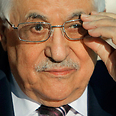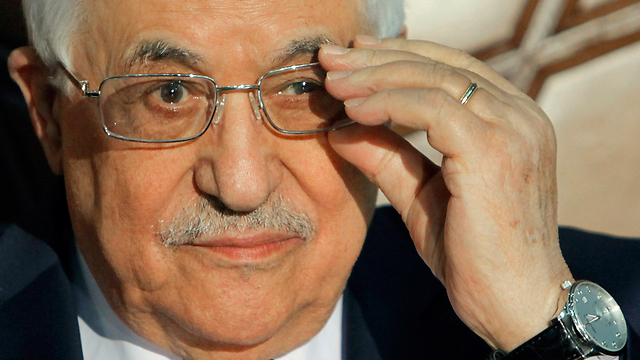
Year after UN vote, Palestinians eye diplomatic action
Pressure mounts on PA leaders to make use of UN observer status as many Palestinians believe peace talks will not yield results. Abbas pledges to 'never give up ounce of Palestinian demands'
No official ceremony was scheduled Friday in the Palestinian territories to mark the historic November 29, 2012 vote of the UN General Assembly.
Related stories:
- Ban says Israeli settlements 'cause for concern'
- Hollande with Abbas: Put end to settlements
- Abbas: Palestinian peace talks delegation resigns
But in comments published Thursday by official news agency Wafa, Palestinian President Mahmoud Abbas pledged to do everything possible to establish a Palestinian state with its capital in Israeli-annexed Arab east Jerusalem.
He said he would "never give up an ounce of the Palestinians' demands nor sign a peace agreement that failed to meet the aspirations of the people."
In a survey published this week, 50.5 percent of Palestinians questioned said they viewed his decision to renew peace talks with Israel in July as "a mistake," and more than two-thirds expected the negotiations to fail.
Abbas has committed to continue the talks for nine months and to take no action against Israel on the diplomatic front during that time in exchange for Israel's release of 104 long-serving Palestinian prisoners.
So far 52 have been freed, with the remainder due for release in two stages as the talks continue.
Chief Palestinian negotiator Saeb Erakat echoed Abbas's words in remarks to journalists and diplomats in east Jerusalem on Friday, saying "you have our full commitment to negotiate for nine months."
But he expressed frustration with the process.
"In the 120 days that I went to negotiate, this Israeli government managed to demolish 159 homes; they killed in cold blood 23 Palestinians; they announced the construction of 5,992 housing settlement units"
Senior Palestinian official Hanan Ashrawi wants to take the statehood campaign into the international area right away.
"I don't see why we are always under pressure not to go, and to postpone (diplomatic initiatives)," she told an audience in Israeli-annexed east Jerusalem on Thursday evening.
"That's one problem that has plagued the peace talks - the exclusion of Palestine from enjoying the protection of (international) law," she said.
'Because of the prisoners'
Erakat had said on Wednesday that he preferred not to wait the full nine months before turning to bodies such as the International Criminal Court (ICC).
His team resigned earlier this month in protest at a rising tide of Israeli settlement construction on land the Palestinians claim for their future state, even as negotiations are under way.
Abbas has so far refused to accept the resignations.
"It's because of the prisoners that we aren't breaking up the talks, are continuing with the negotiations and not approaching the UN," senior PLO official Nabil Shaath said in an interview published by Israel's Ma'ariv newspaper on Friday.
"But I don't think there is much more that can be done with the present Israeli government," he added.
Independent Palestinian legislator Mustafa Barghuti agreed.
"The most important thing that we can do is go to the UN and from there, possibly go to the International Criminal Court. This could cause Israel the most damage, especially in terms of its settlement expansion," he said earlier in the week.
In a statement accompanying a report on the "virtual impunity" from prosecution enjoyed by Israeli settlers who assault Palestinians, the Palestinian human rights group Al-Haq called for "Palestinian representatives to take measures through the ICC to bring Israeli leaders to justice."
Palestine voted as a state in the General Assembly for the first time on November 18 in the election of a judge for the International Criminal Tribunal for the Former Yugoslavia, "moving toward the long-awaited status of full membership," Foreign Minister Riyad al-Malki said.
But according to reports, Malki's ministry was forced this week to freeze an application for state membership of the International Olive Council – an intergovernmental organization of producer and consumer nations – due to opposition from Britain and Germany.
Questioned by AFP, Malki said he had no knowledge of such a project and reiterated the Palestinian pledge to refrain from joining international bodies for the duration of the talks with Israel.
- Receive Ynetnews updates directly to your desktop











